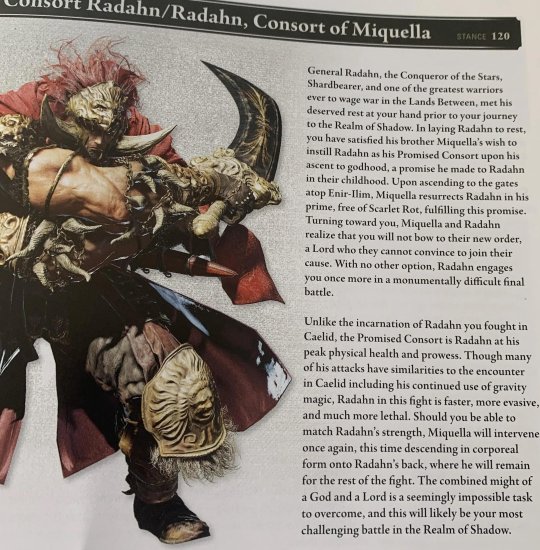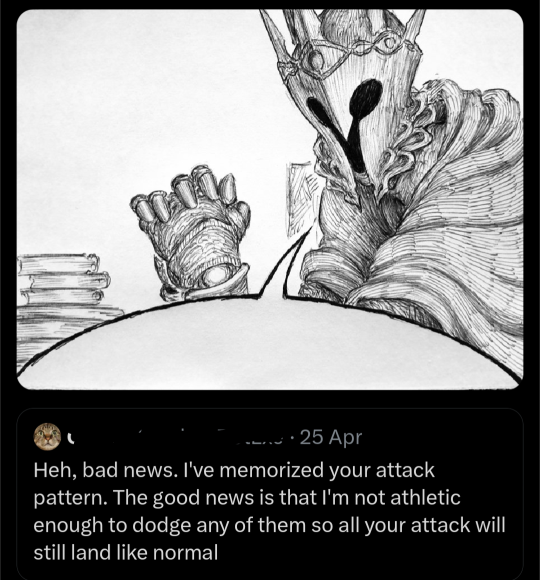starscourgc
469 posts
that mutual that does not PLAY about starscourge radahn
Don't wanna be here? Send us removal request.
Text


man I loooove drawing this guy :'>
748 notes
·
View notes
Text


*the mind electric plays*
46 notes
·
View notes
Text

when miquella said age of compassion he didnt mean that
344 notes
·
View notes
Text


ᅠ «𝐚 𝐲𝐞𝐚𝐫𝐧𝐢𝐧𝐠, 𝐬𝐨𝐦𝐞𝐭𝐡𝐢𝐧𝐠 𝐈'𝐯𝐞 𝐧𝐞𝐯𝐞𝐫 𝐟𝐞𝐥𝐭 𝐛𝐞𝐟𝐨𝐫𝐞»
818 notes
·
View notes
Text
Having people like my ocs is so embarrassing like nooooo don't look at himmm I'm still building himmmm 😢😢😢 nooo he's not ready for you yet 😢😢😢😢😢😢 he's still in pre-release beta version 0.8 😢😢😢😢😢😢😢😢
9K notes
·
View notes
Text
it is always correct to draw a character fatter than they are in canon
9K notes
·
View notes
Text

She’s my favorite🥰
770 notes
·
View notes
Text

It beggars belief, but...
I'm afraid Tender Miquella fails to grasp the humiliation implied by this act.
404 notes
·
View notes
Text

Boy who loves stargazing.
942 notes
·
View notes
Text


“Tell the Two Fingers, that Ranni the Witch cometh, to rend thy flesh. With a fateful wound, ne'er to heal.”
-
(I repainted a Ranni piece I made 2 years ago!)
821 notes
·
View notes
Text

kinda obsessed with the idea that messmer impaled the dancing lion on two stakes to push forward the idea that the divine lion is not true divinity but instead just men in a costume.
57 notes
·
View notes
Text
This image from the third Elden Ring Book of Knowledge on SOTE has been circulating, and people are citing it as proof that Radahn was a willing participant in Miquella's plans. I don't think these words can serve as definitive proof, and I maintain that Radahn was controlled by Miquella. Here's why.

Image credits: @/Siofra_Mariner on Twitter
To me, the words "their order" and "their cause" don't prove that Radahn is united with Miquella by choice. These deliberate words make me think of Leda's group, Those United in Common Cause, who end up at odds with each other when Miquella's charm inevitably breaks. I think that that very same influence is being alluded to here, with Miquella having used his influence to control Radahn and join him to his cause.
The words "Miquella will intervene once again" imply that Miquella has to fight against some form of natural current, has to change the course of fate, in order to succeed (or try to succeed) at defeating the Lord of the Old Order; to me, the first time he intervened and changed the course of fate is referred to in the first paragraph, where they detail his resurrection of Radahn's body, free of scarlet rot. The text also refers to Radahn's "deserved rest" - again implying that Miquella's resurrection and use of Radahn is somewhat unnatural and morally wrong. If Radahn truly were a willing participant, I don't think that it would have been referred to this way. The story of one intervening with another's fate ironically occurs earlier in the base game, with Radahn stilling Ranni's fate by holding back the stars.
Next, I want to talk about, guess what, more wording.
"Miquella's wish to instill Radahn as his Promised Consort upon his ascent to godhood, a promise he made to Radahn in their childhood."
Note that the wish is Miquella's wish, not Miquella and Radahn's wish, not their collective wish. The word promise is also interesting if we look at the way Miquella uses the word in the DLC dialogue, and towards whom it's directed.
"I promise you, a thousand year voyage, guided by compassion."
Miquella says this to the Tarnished when they are grabbed. Two grabs, and the Tarnished gets their "Heart Stolen", charmed by Miquella forevermore. The Tarnished is resistant, and this is one way through which Miquella deals with resistance.
To Miquella, promises and vows are not shared agreements, but they are the way he enacts his will and influence upon others. They are unidirectional, assured, and a means to an end. His compassion extends to all, but strips all free will, and Radahn's is no exception.
A few notes that didn't fit into any of the above points:
This is my interpretation of the game and the text, and I always enjoy reading other people's interpretations. I think that's the great thing about Elden Ring's ambiguous lore; there can be many readings, and we'll really never know which are right.
I'm very biased when it comes to the topic of Miquella's desecration of both Radahn and Mohg, one in body, and one in soul - I feel like it really cemented how wrong Miquella ended up turning after abandoning all those aspects of himself in the Land of Shadow, and I felt all kinds of icky and sad when I finished the DLC because of this. St. Trina's being discarded and her death was devastating, especially when she was one of the most human and compassionate characters in Elden Ring, granting respite to all the frenzied merchants out of true compassion.
I do believe that Miquella is a victim of the cycle, though, and that he lost himself in more ways than one after witnessing what happened to his mother. To Miquella, the only way to make people stop doing horrible things is to stop them from doing anything of their own volition at all. In theory, it works. But it is so sad. I'm reminded of Melina's dialogue when you choose to inherit the frenzied flame: "However ruined this world has become, however mired in torment and despair, life endures. Births continue. There is beauty in that, is there not?" I sympathize with Miquella, I really do. I understand that he did all this because he not find any alternatives. The world being comprised of cyclical happenings that one person cannot fix is a recurring theme in Souls in general, and Miquella is just another victim of another cycle, which ends up begetting more violence, much like the violence enacted on Marika which prompted Miquella to try and fix things in the first place.
That’s it! I really needed to get this off my chest, and it definitely didn’t fit into a tweet (which is where all the discourse is happening lol). If you made it to the bottom of this yap, I'd love to hear your thoughts on this as well! Thanks for reading my ramblings <3
152 notes
·
View notes
Text
Godrick, Marika and grafting

With the new shaman & Marika lore, we found out that what made the shamans weak, having (diluted but) of the same blood, Godrick essentially turned that weakness around to use it as a weapon. He turned what made the shamans weak, into strength. He took that oppression and is now using it as a means to fight anyone who tries to harm him.
But of course, since it is Godrick, fandom once again sees the situation in the worst possible light & often reminds others that it's the only right way.
See that text above? See how it's possible to give nuance to characters that you don't like / are conventionally ugly / are the lowest hanging fruit?
Reminder people, just because a popular account (be it a youtuber or artist) establishes among their sizeable following that a character can be only interpreted in their way only, which in Godrick's case is usually in the worst faith, doesn't mean you can't challenge that. It doesn't mean you can't have your own ideas, despite most of the fandom excelling at herd mentality and fanatism towards big creators. Don't be afraid to talk about your ideas and interpretations, especially if those ideas are considered uncommon.
67 notes
·
View notes
Text


the miserable Snake again.. love is in the air? WRONG!!!!! ABYSSAL SERPENT
390 notes
·
View notes
Text

Lacrima and Radahn as 1.0 intended

353 notes
·
View notes
Text


2 years difference… waow
115 notes
·
View notes
